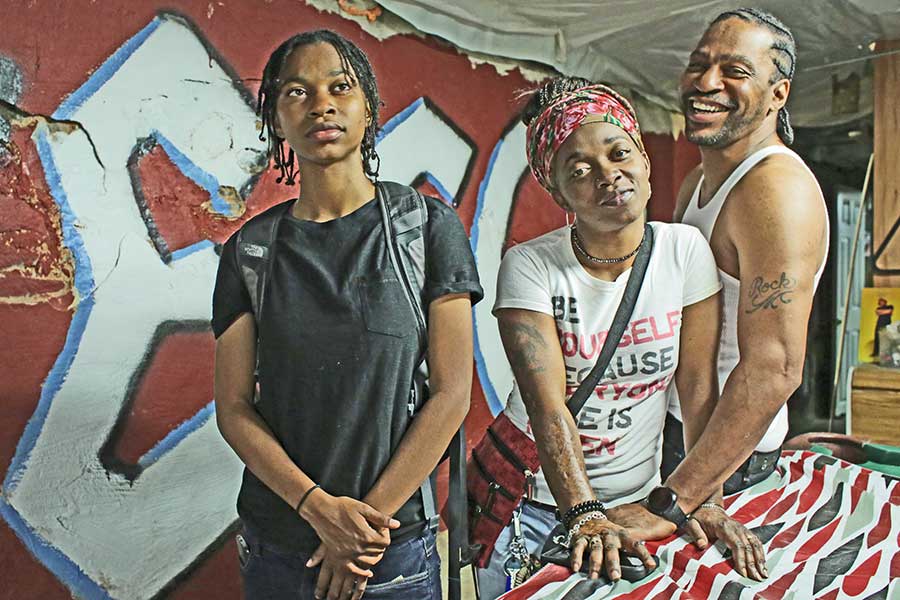Jonathan Olshefski’s poignant observational documentary “Quest,” opening Dec. 1 at Ritz at the Bourse, chronicles Christopher, aka Quest Rainey, his wife Christine’a, their daughter PJ and his son William as they eke out their lives in North Philadelphia. Unfolding during the eight years of the Obama administration, the film details the family’s trials and tribulations, from William battling cancer and a tragedy that befalls PJ to a leaky roof that needs fixing and a friend dealing with addiction issues. In a casual but affecting moment, PJ comes out; another scene has her parents discussing PJ’s sexuality. But the focus of “Quest,” and why it is so compelling, is the family’s resilience. This African-American family possesses a quiet dignity that is truly inspiring. Olshefski captures the intimate moments with affection.
PJ, who is now 18 — she was 9 or 10 when filming started — spoke with PGN about making “Quest.”
PGN: What was your response to the idea of being filmed for what turned out to be eight years?
PJR: To be honest, when it started I was young, so seeing the camera was new and cool. As I got older, there was more footage of me, because my dad wanted me to be in the film more. I didn’t think the film was going to go anywhere. It was just Jon [Olshefski, the director] with the camera. I was cool with it because my dad and John were friends. He was cool with my family already. Seeing the film, I reminisce about certain things because I knew what I was thinking at the time we shot them. Now the film gives me more courage. I moved on from all that I’ve been through.
PGN: Your father has a music studio. You are seen playing drums and later the piano. You say in the film you want to be a DJ. Can you talk about your interest in music, and if/how you plan to pursue it?
PJR: I stopped playing the drums because now making beats in the studio is all done with technology. I started doing R&B music and making my own songs. I was thinking about going to college for business, but I wanted to have my own studio. I grew up with a studio in my house, so why not use what I know?
PGN: The film is all about your family. How would you describe your relationship with your parents?
PJR: My dad and I are super-close. My mom and I are close too, but Dad and I have music in common, and that makes us closer. He’s honest with me. After my [accident], I fell victim to the streets. My dad talked to me about that and he got me back in the right direction. Honesty was the key. It made us closer.
PGN: Let’s talk about the accident in the film. Can you discuss how you coped with the trauma? You are seen being very brave at times, but also feeling very vulnerable.
PJR: With the support system of my family and the people around me, I felt stronger. Everyone was there for me. I had to experience all that stuff but it made me strong. Reality makes you stronger; you have to face it. Everyone in the ’hood knows me. I see others with disabilities, and now I think differently about them.
PGN: You were a bit of a tomboy in the first half of the film. What can you say about coming out on camera?
PJR: To be honest, I felt like, the way people look at the gay stuff, it’s hard to explain. I pay it no mind. [Being gay] is common here. In my generation, there are so many gay people my age.
PGN: What did you think of the scene in which your parents discuss your sexuality?
PJR: I think it’s funny. They are fine with it now. It was a little hard for my dad at first. No one wants their kids to be gay; they want them to be perfect. Honesty is the key. If the person really loves you they accept you for who you are. I’m glad my mom and dad aren’t [loving me from a distance].
PGN: The film covers the period in your life during the Obama administration. What are your observations about his presidency and where we are now?
PJR: Obama, I feel he is our best president. Even though he couldn’t do as much as he could, Trump’s in office now and it’s chaos. I wish people could be more open-minded. People where I live don’t pay attention to politics. We need a savior, someone like Obama. If Obama were in Trump’s shoes now, he would be out of there! If Obamacare didn’t have Obama’s name on it, Trump wouldn’t be trying to get rid of it.
